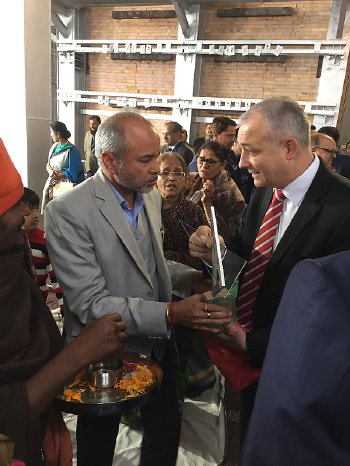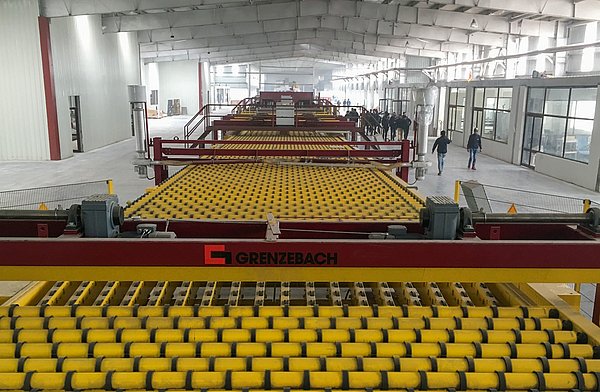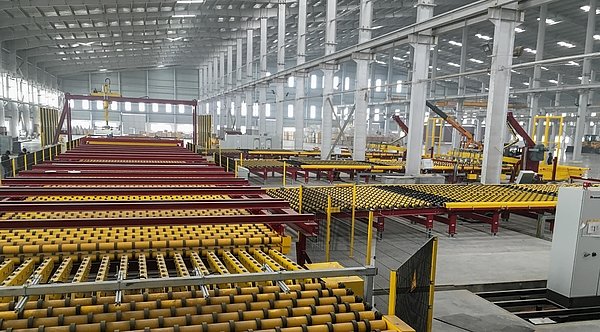A 380,000 square meters of float glass production facility is great for a big celebration and this was proven by the managers, employees, business partners and guests of the Indian Gold Plus Glass Industry Limited.
The company's new float glass line went into operation at the Roorkee plant, which is situated between the Ganges and Yamuna River with festive ceremonies. The furnace of this 700 ton float line was heated up in the presence of several hundred spectators in an extensive firing-up ceremony by opening the gas tap. The ceremony was started by a religious act based on Hindu beliefs. The heating-up ceremony was followed with a tour through the production halls. Finally, a copious meal was served to all guests. "It was one of the most sumptuous feasts in which I ever participated during a factory opening", said Jan Lukassek, Sales Manager Glass at the Grenzebach Group. It is the second time that Grenzebach delivered the Cold End for a Float glass line to Gold Plus Glass Industry.
About four weeks after the heating-up ceremony in Roorkee, located about 180 kilometers north of Delhi, first glass floats on the tin bath of the production line and is conveyed by Grenzebach conveyors. The facility produces 700 tons of float glass per day on a 24/7 basis. Grenzebach solutions for the processing and handling of flat glass with a thickness of 2 mm up to 12 mm is a perfect fit for a permanent 24/7/365 manufacturing of float glass. "Highest cutting and stacking accuracy, a best possible defect rate and highest availability of the equipment are decisive criteria of success for us in float glass production. Grenzebach is a reliable as well as an innovative partner for a stable production process", says S.S. R Murthy, Plant Head of Gold Plus Glass Industry.
With Pianos and Jumbo stackers
The Cold End equipment from Grenzebach is equipped with a thickness and strain measuring system, emergency cross cutter and a scanner for glass sheet inspection. Quality Control is supported by means of the automated cutting along with a marking bridge, where defects are automatically marked. It goes without saying that an automatic production process control is integrated as well. Defective glass plates are evacuated onto an inclined line section with integrated piano conveyor belt and are removed into the crusher. Glass qualities are sorted onto double-deck conveyors with piano function. Safe unstacking of the glass comes at the end. There are three sidelegs with stackers and rotary platforms, where glass sheets can be handled in single and double mode. Especially for big formats and inhomogeneous glass sizes, there is a separate jumbo stacker. "We will support the Cold End in close cooperation with the experts from Gold Plus over the complete life cycle. That the management already relies on Grenzebach technology for the second production line is a real confirmation that even our service for the equipment is already on the highest possible level, says Jan Lukassek. More than 300 Grenzebach lines are used in glass industry world-wide.
One of the Big Players in India
Jimmy Tyagi, Gold Plus Glass Industry Director: "By means of the new line, we are able to extend our capacity from 470 tons to 1170 tons of float glass per day. We extend our product pallet to all sorts of tinted glass and tinted reflective glasses. Besides, we are able to extend the existing clear glass series. "Gold Plus Glass Industry Limited is a Big Player in the Indian glass industry. The company, which sets the focus on today's production, processing and trading of various glass categories, was founded back in 1985. It is the first Indian-owned company with its activity in float glass production. Two float glass lines are in operation since January 2018 at the Roorkee plant. Keyword High-performance Technology: The new float glass line will be operated continuously for about 15 years until the next cold repair - Grenzebach Cold End included.





